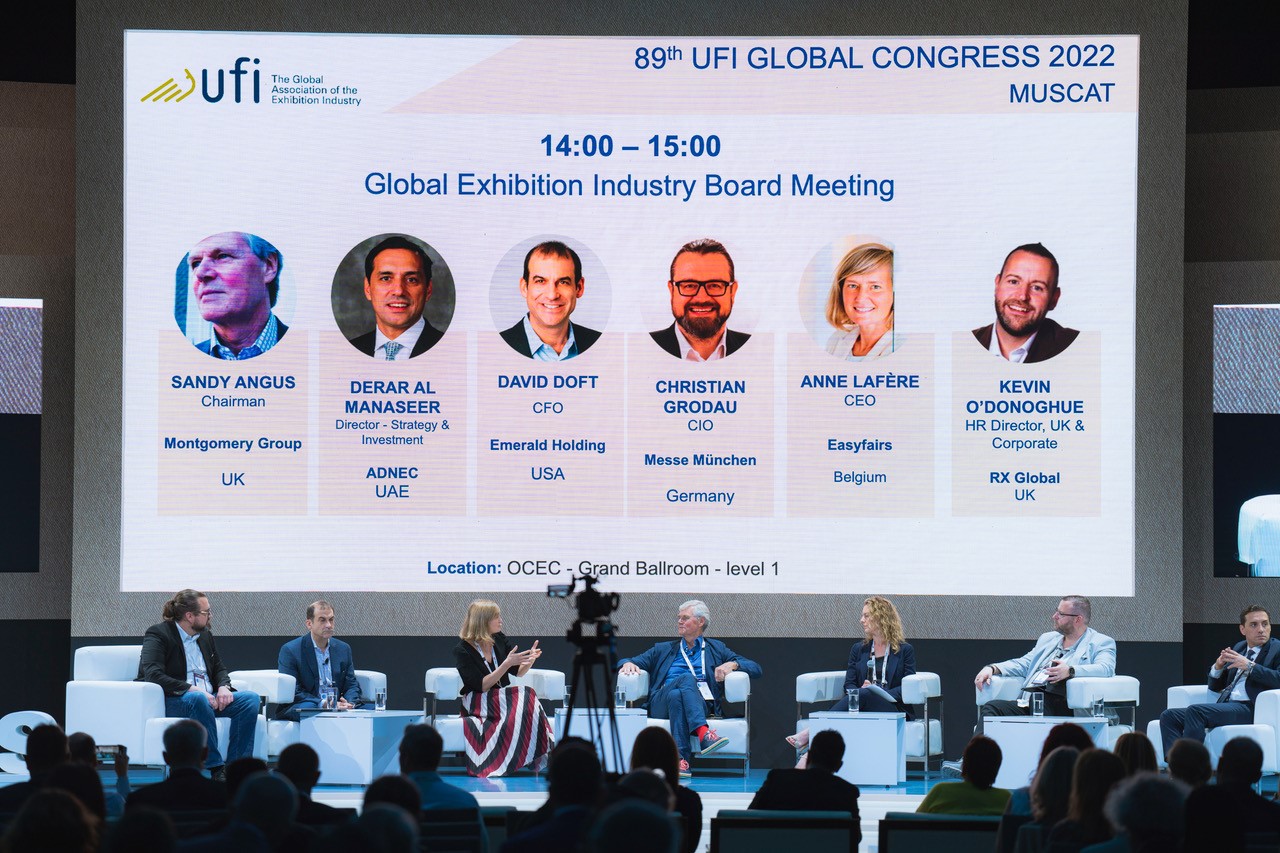As I look back and reflect on my experience at the UFI Global Congress, held Nov. 14-17 in Muscat, Oman, one of the most informative and valuable sessions to me was the Global Exhibition Industry Board Meeting, which featured senior leadership from a variety of companies — including ADNEC Group, Emerald, Messe Muenchen, EasyFairs and RX Global — discussing the current state of affairs in their functions as CEO, CFO, HR Director, CIO and Director of Strategy & Investment. Montgomery Group Chairman Sandy Angus moderated the session together with UFI’s Caitlin Reed and asked tough questions about the most pressing topics at the moment.
What are the key quotes that capture the essence where the global exhibition industry stands in Q4 2022? What’s trending? What are industry leaders saying? Who’s partnering? Whose revenues are up? Where are organizations spending their time and resources? These are the quotes that stood out to me.
- Rebounding to pre-Covid revenue levels. “Revenues are back to pre-pandemic levels, but we still have 8% to go in terms of square meters,” said Anne Lafere, CEO of Easy Fairs, which organizes 160 shows a year in 14 countries in Europe and manage or own eight venues in Belgium, Sweden and the Netherlands.
- Full stop to full speed. “As a CEO in post-Covid era, we have lots of challenges in front of us. The first one being … get the talents back on track. Our talents had to go from a full stop to full speed to deliver flawless events with a shortage of staff with weakened suppliers. And on top of that, we had to onboard and train lots of new recruits and find the magic recipe in terms of homeworking.”
- M&A pipeline is heating up. “The pipeline for M&A is heating up. There are more opportunities today than one year ago,” said David Doft, CFO, Emerald, the largest U.S.-based operator of trade shows that is publicly traded on the New York Stock Exchange. Emerald runs 150 a year across 20+ different industries. “We’re still sitting a little bit below pre-pandemic levels on multiples. But as with anything, there’s a range based on the size of the business and based on the growth profile of the business. We’ve bought seven companies in the last two years, and we’ve paid anywhere from five times to nine times for businesses. What we’ve done in every single instance, given this unusual environment — of either buying a business when the world was shut down or as it was coming out of the pandemic — is they’re all structured with deferred components based on performance on earnouts.”
- Nimble pricing strategies. “We created a centralized pricing department. We hired a pricing director out of the airline industry,” Doft said. “Our view is that some the most sophisticated industries are pricing for value and trying to adopt those nimble pricing strategies within our company. Nonetheless, that leads to a lot of technology improvements that are needed to be able to realize the promise of all of that, and it’s not the easiest thing either. We’re the middle of that journey, but we’re already seeing tangible benefits. I would say while our 2022 events were probably up 10, 11, 12% in pricing from 2019, our 2023 events will likely be up 10% from 2022 as we adopt these strategies. That’s the overall yield where each individual customer, they’re more paying for what they want and where they perceive value. That’s a key part of our strategy to be a financially healthy and growing organization.”
- Offshoring some services to reduce costs. “For anyone who doesn’t know, we operate a shared service center in the Philippines,” said Kevin O’Donoghue, HR Director, UK RX Global, who has been in the role and the exhibition industry for only six months. RX Global, which is owned by the public company RELX, produces more than 400 events covering 43 sectors in 22 countries, in-person and online. “They’re geared towards repetitious high-volume transactions. We are finding efficiencies. We are finding it more effective. We’re probably a little bit fortunate because our service center is not just RX. There are components of it that we share with RELX as part of the organization. Those things lend to efficiency. We have, for example, quite a chunk of HR administration, first line support that sits in our Manila team. It might not be for everyone. There’s a scalability to how effective that will be. But, certainly for us, that’s been effective.”
- Competitive compensation is critical to attracting and retaining talent. Angus asked: How much you are having to increase the salaries of your employees to keep them in the last year? “Honestly, we are not,” said O’Donoghue. “We have a robust compensation framework, and we operate within that. We are not yet doing any sort of cost-of-living payments. We’re aware of people where people are at. They’re benchmarked against the industry and against our broader organization. So we haven’t got slush fund where we’re going to give everyone an extra 5K this year or anything like that.”
- Digital is not generating significant revenues. “Our personal experience is that neither pure digital substitutes nor hybrid will bring decent revenues,” said Christian Grodau, CIO, Messe Munchen GmbH, a German-based trade fair organizer and venue operator with subsidiaries throughout the world, with the largest being in China, India and Brazil. “The metaverse is on our watch list, but I think in the short period of time, it will not generate significant revenue as far as I’m concerned.”
- Metaverse is not a current threat. Angus asked: Is the metaverse a competitive medium for our industry? “If I just look back for the last two years, we tried a lot in terms of digital and in the end, everyone is here,” Grodau said “We are here because we were going to have physical interactions, and this is the tech guy saying it. I believe in human interaction happening in one room.” This comment generated a round of applause in the room “It can be an augmentation, but it cannot be a substitute,” he said. “If the augmentation will help us to generate more revenue, fine. But I don’t think this industry will go away cause of the metaverse.”
- ESG moves to the fore. In terms of environmental, social and governance (ESG), “we are shifting things from reactive approach to proactive approach,” said Derar Al Manaseer, Director – Strategy & Investment, ADNEC Group, which is ADQ, an Abu Dhabi Government Company mandated to own, oversee and operate development related state-owned enterprises in various sectors. ADNEC Group comprises Abu Dhabi National Exhibition Centre, Al Ain Convention Centre, ExCeL London, Capital Gate, Andaz Capital Gate Abu Dhabi, Aloft Abu Dhabi, Aloft London ExCeL, DoubleTree By Hilton London ExCel, Anantara Sir Bani Yas Island Abu Dhabi Resort, Qasr Al Sarab Desert Resort by Anantara, IDEX LLC, Capital Hospitality and ADNEC Services. “ESG is fundamental part of our journey and our story, and we have to do a lot of investments. So how are the ESG-related questions considered as part of the investment? How we evaluate our targets when we buy them with the ESG lens. And vice versa, when we invest internally in initiatives, how we keep ESG-related issues in our mind when we do our process. We want this to be part of our corporate decision-making process.”
- Investing in digital transformation and data monetization. “We have now six clusters. It became important for us to have an overarching digital transformation role, and that’s why for the first time ADNEC Group is hiring a chief digital transformation officer. We had the same discussion about the value of digital transformation. Is it to enable the business? Is it to enhance the customer experience or to change the business model? And always, we were keen and careful. We don’t want to offset the physical. We want to augment, to enhance, to complement and to build on the mega trends. Amongst them is the data and data monetization. It’s important now for us to capture the data and monetize it.”







Leave A Comment